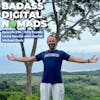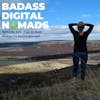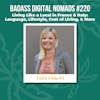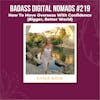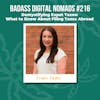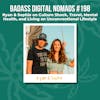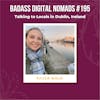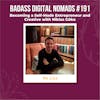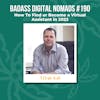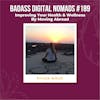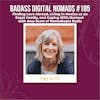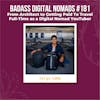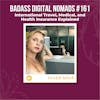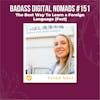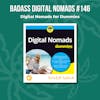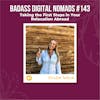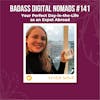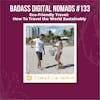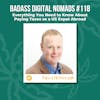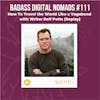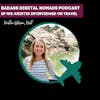Living in Spain as an Expat or Digital Nomad With Chase Warrington, Host of the About Abroad Podcast
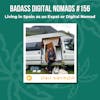
What is it like to live long-term in Spain and how do you do it? Join Kristin in her first interview of 2022 as she speaks with Chase Warrington about working remotely as a nomad and living in Spain long-term.
What is it like to live long-term in Spain and how do you do it? Join Kristin in her first interview of 2022 as she speaks with Chase Warrington about working remotely as a nomad and living in Spain long-term.
Chase is the Host of the About Abroad Podcast and Head of Remote at Doist. As an American expat living in Valencia with his wife and dog, Chase offers valuable insight into the cost of living in Spain, how to get your first remote job, and how YOU can move to Spain, too!
In this episode, Chase shares the story behind why he and his wife decided to quit their jobs to travel the world, why they settled in Spain, and all about their newfound Spanish lifestyle.
Tune in to hear Chase describe a day in his life working from a Spanish coworking space (siestas optional), the incredible diversity España has to offer, and the countries he’s planning on traveling to next!
EPISODE 156 TOPICS DISCUSSED/WHAT YOU’LL LEARN:
- [04:16] Having a social life and community while being nomadic.
- [07:18] Why and how Chase and his wife quit their jobs to travel the world.
- [14:18] Lessons learned from running an ecommerce business abroad and traveling through Central and South America with a dog.
- [23:48] How Chase found a remote job and transitioned to the role of Head of Remote at Doist.
- [27:25] & [56:23] A day in the life of a digital nomad living in Spain.
- [29:31] The powerful benefits of transitioning your company to a remotely work structure.
- [40:19] Tips and tricks for applying for remote jobs for the first time and why you need to research “remote-first” jobs.
- [51:13] How to live long-term in Spain AND gain permanent European residency with the Non-Lucrative Visa vs. the Digital Nomad Visa.
- [59:56] The cost of living in Spain vs. the USA and where you’ll save the most money in expenses (spoiler: health insurance!).
- [1:08:43] The diversity of Spain: Culture, food, climate/terrain, languages, and more!
- [1:11:46] Chase and Kristin’s thoughts and opinions on the NEW Digital Nomad Visa and paying taxes as an expat/digital nomad.
QUESTIONS ANSWERED:
- [10:50] How do you get a remote job?
- [17:43] How do you travel abroad with a large dog?
- [26:18] What are the responsibilities of a “Head of Remote” position?
- [29:31] Why should companies consider transitioning to fully remote or giving their employees the option to work remotely?
- [35:08] How does Doist operate efficiently and asynchronously?
- [38:56] What project management tools do you use?
- [46:53] Why did you move to Spain?
- [53:49] What countries are you thinking of going to next?
- [57:31] Why did you choose to move to Valencia?
- And much more!
RESOURCES
Special Offers:
- 20% off Organifi Superfood Blends and Travel Packs 🌱
- Pre-Order Digital Nomads for Dummies
- Join the Digital Nomad Visa Database
Articles:
Related Videos:
- Living in Spain: Cost of Living for Foreigners in Spain
- Spain is OPEN! Reopening for Tourism in 2021
- Why I Quit Youtube
- Best Places to Live Abroad in the World [Top Ten List]
- EXPAT EXPLAINS: Americans Abroad on Paying Taxes and Renouncing Citizenship
Podcasts:
Remote Work Resources:
Other Resources Mentioned:
- Pet Travel
- Skiing in Catalonia: Val d’Aran
- Estonia’s e-Residency Program
- Estonia’s Digital Nomad Visa
Connect with Chase
- Visit his website
- Listen to About Abroad Podcast
- Connect with him on LinkedIn
- Follow him on Instagram
- Follow him on Twitter
- Visit the Doist Blog
...........................................................................................
Connect with Kristin:
- Follow on Instagram
- Subscribe to Traveling with Kristin on YouTube
- Subscribe to Digital Nomad TV on YouTube
- Join the Badass Digital Nomads Facebook Group
...........................................................................................
Support the Badass Digital Nomads Podcast:
- Buy Kristin a Coffee
- Become a Patron
- Leave a 5-Star Review
- Buy Official Merch
- www.badassdigitalnomads.com
...........................................................................................
A special thank you to Kristin's Patrons: Walt, Shawn, Richard Y, Heather, Karen, Kiran, Scott, Michael J, Isaac, Mike M, Yasmine, Erick M, Yohji, Ron, Gary, Annie, Henry L, Keith, Stephen, Warren, James, Daniel, Gary B, Emily, Rich, Phil, Anthony, Jennifer, Kathleen, Dave B, Brian, Christopher, CJ, David G, Mike R, Chip, Shelly, Ron, Paul, Andy, Jeffrey, Paulo, Stephen, Michelle, DJ, Francis, Dave M, Carlos, and Ron
Become a Patron for $5/month at Patreon.com/travelingwithkristin
Special welcome to my newest Patrons, Karissa, Jim R, DJ, and Em Winn! ❤️
...........................................................................................
Podcast descriptions may contain affiliate links of products and services we use and recommend at no additional cost to you.
Introduction: Welcome to Badass Digital Nomads, where we're pushing the boundaries of remote work and travel, all while staying grounded with a little bit of old school philosophy, self-development, and business advice from our guests.
Kristin Wilson, Host: 00:00:22 Hey there, Kristin, from Traveling with Kristin here and welcome to episode 156 of Badass Digital Nomads. I am so excited to share today's episode with you today because it's our first interview of 2022, and it's with my friend Chase Warrington. Chase is an American expat who lives in Spain with his wife Allison and their dog, Coda. Chase is the host of About Abroad podcast and he's also the head of remote at Doist, a fully distributed remote company with more than 25 million customers and a hundred-plus employees spread throughout 30 countries. Chase is also a remote work advocate and thought leader. He's a regular contributor to many of the world's top remote work outlets such as Remote How, Wrkfrce, Future of Work, Running Remote and others. Today you'll hear how Chase and his wife decided to quit their jobs back in Charlotte, North Carolina and TR Travel the World with without much of a plan.
Kristin: 00:01:32 They started off in Ecuador and traveled the world until finally making their home in Spain. So today's episode will share a lot about Chase's journey, his lifestyle in Spain, and give you some glimpses and insights into the lifestyle there, plus how you can live there with the digital nomad visa or the Spain non-lucrative visa. We discussed some of the elements and pros and cons of those, some about his cost of living and all around. It was a great conversation. I highly suggest that you also check out Chase's podcast About Abroad and you can follow him over there at aboutabroad.com. Enjoy.
Podcast Interview:
Kristin: 00:02:17 I don't know how long we've been in touch over email, but I'm glad that our internet paths crossed <laugh> and I know we've been wanting to talk to each other for a really long time and thanks for your patience and coming onto the show and I'm really excited to be on your show too. So, but I feel like that's kind of how the, the digital nomad or remote community is, like we establish relationships and friendships and even professional networking relationships with people online and over the years you do get to know each other even if you don't even talk on the phone. Like you just get to know people through their social media and like following what they're doing. And in your case you create content so it's a bit easier to, you know, stalk you online and <laugh> and learn about you. But, um, but yeah, the remote community, it just, I love that it's so open and that people kind of start off in a positive way as, as internet friends and then when you talk to them or when you see them in person at an event or something, it's kind of like picking up where you left off with an old friend from high school.
Kristin: 00:03:31 Do you feel that way?
Chase: 00:03:32 100%. Yeah. And I, you touched on something that really resonates with me is like how open this community is. Like, I don't know if that's the right word or not. I I tend to think of it like a community, this remote work digital nomad community. We're really good at doing things online and, and building relationships is part of that. And so sometimes I'll be in the middle of a conversation with someone and be like, oh wait, we haven't actually met before <laugh>. And it, it's sort of mind-blowing and uh, I don't know, that brings me a lot of joy because you can connect with people all over the world and really like fine tune your relationships when you have such a, a wide supply of people to, to potentially connect with. So yeah, I mean I've, I absolutely love this aspect of this, uh, this digital nomad world that we're in.
Kristin: 00:04:21 Yeah. And that has become even more top of mind since I moved to Miami temporarily, however long I'm here. And the reaction that I get from people who I've met who've are born and raised here, especially when I go into deep work mode, like I've been writing my book all year and you know, I have YouTube and the podcast and everything and my relocation business. And so sometimes my new friends, like my new physical real life friends that are here, they're like, oh, where have you been? Like, we haven't seen you lately. And they don't realize the depth of our social network and our relationships online. So it's like even when you don't leave your house or if you don't leave your van, like you're still connected to hundreds if not thousands of people in the remote work community. So in that sense, I really, I never feel alone, but sometimes people from that are still living a traditional lifestyle, they don't understand and they, they see it as being isolated socially somehow.
Chase: 00:05:28 That's so, so very true. And it's really funny cuz I gather, like you and I both enjoy having that social community around us, yet we are also, you know, somewhat nomadic and, and that can, someone might look at that and say, oh, it's kind of hard to put down roots and physically build that community. I know when I was like early on in my exploration of remote work and location independence and stuff, that was like a real dichotomy between like the way that I was before because I was very extroverted and social and had a big group of friends. I grew up in a place where I, you know, went to elementary school, middle school, high school with all the same people and you know, had some really deep relationships there. And so it came across as like kind of weird when it was like, wait, what are you doing going and living in China and like living in, in, in Europe and like going off on your own?
Chase: 00:06:16 Like, don't you miss the, the social connection? But I think it's a surprise to people who aren't in this, this world with us that you can have those relationships virtually, like the, you know, the way that we've crossed paths. But then also I think there's something really cool about when you're abroad and when you're like living in a place, whether that be for like a week or a year, the relationships that you build with other expats and locals and such is just so, so interesting, so rich that you might not have even gotten that if you were, if you were just back home. So I feel like my social cup is, is totally filled, which I think is still a surprise to a lot of people from the outside looking in.
Kristin: 00:06:55 Yeah, definitely. Wow, you just made me think of my first time coming back to the US after studying abroad and how I felt like I had changed so much and I had had all of these enriching experiences and then I came back to my sorority and it was like business as usual, all, you know, American Pie College that like hadn't missed a beat. Things were still the same. But um, that actually is where I wanted to start with this interview is to kind of take us back to the year that you and your wife decided to go nomadic like to quit your jobs. What was the situation there? I know you mentioned, you know, traveling a bit in college, but at what point did you guys meet and get married and decide to leave the rat race?
Chase: 00:07:42 Yeah, so we um, we both met, we met in college and decided like both early on had a, had a really big interest in travel. But I think we also thought like that's a young person's game. Like you only get to do that while you're maybe in college and then after that you'll get your customary 10 days of vacation and maybe every other year you can hop over to Europe for five days and get back. And that was like the <laugh> that was about as good as I thought I could have hoped for at the time. So I think, I thought, I think we both thought we kind of had to get it out of our systems and um, and sort of jumped right into the, i I hate to call it corporate cuz it wasn't the corporate world necessarily, but especially compared to the lifestyle it live now, it felt a bit more, more corporate.
Chase: 00:08:26 And uh, we, we both kind of went in head, dove in headfirst on the careers for a few years and, uh, eventually found ourselves in Charlotte, North Carolina with like the, you know, very typical like two corporate jobs, uh, good incomes, a house and a nice neighborhood and company cars and, you know, all the perks, the stock options and the gym memberships and all and all that stuff. Uh, you know, the, the 15 year mortgage doing all the right things that you, you think you're supposed to do. And we just slowly, we were, oh, and I should also mention we were taking these, you know, we were taking our two weeks of vacation every year and literally we would leave on a Friday, fly over to Europe and spend like six days, see three cities and fly back. And like, it was just so stereotypical and so against what we really wanted to do.
Chase: 00:09:17 I mean, we were like dying that slow death of just like, we're just living for these two weeks a year where we get to do what we really love, which is traveling. So at one point, I mean, and I credit my wife a lot for this, she said, you know, we need a plan to move towards location independence. That's what's really, we're both, I was working fully remotely, um, and I've only always worked remotely, but she really wanted us to get to, uh, a point where, where we were really location independent. I thought it wasn't possible. I knew for sure we'd have to make big sacrifices, but we started by say she, she quit her job, she started an online business a year and a half later that was doing okay and, and I quit my job and then we, we actually left from Miami, uh, where you are and, uh, and headed off to Ecuador and uh, and then started our journeys there.
Kristin: 00:10:04 Wow. And so you were working for yourself or another company? This was before Doist?
Chase: 00:10:10 Yeah, this was before Doist just, just, I found Doist during that journey, which I think is kind of a cool part of the, of the story because sometimes you gotta take like a huge step back. Uh, which we took two giant steps back, uh, quitting quitting two real jobs and, and running a little online Etsy shop together, which eventually became two Etsy shops while we were traveling during this first year. But, uh, yeah, I mean that was that at the time we were, you know, we both had like real jobs working for another company and then when I, when I, uh, when I left that job, we, we went into the e-commerce world for a couple years before I found Doist, while we were traveling around in Europe.
Kristin: 00:10:50 Oh, okay, great. Yeah, I wanted to ask you how you found that job too, because people are always like, how do you even get one of these remote jobs? But you make a good point by saying it's not a linear path. It's like, yeah, you know, two steps forward and one step back or sometimes one step forward and three steps back. But if you keep going, then eventually it works out. I just saw a quote in a book actually, it was by John Lee Dumas from Entrepreneurs on Fire, and he just said the difference between success and failure and this location independent lifestyle is just whether you quit or not or keep going. And, um, that's definitely been my experience. I mean, I've kind of been all over the map like a spider web in finding what to do for work and to create a location, independent income. But I can definitely relate to what you said about Charlotte, because I don't know if you knew this, but I lived there in 2014. I, I think it was What year were you there?
Chase: 00:11:55 Oh, wow. Yeah, we were there at the same time. No way. I was only there for a couple years, but I was also there in 2014.
Kristin: 00:12:01 I was there, well my ex-boyfriend was from North Carolina and so I kind of had a home base at, we had this apartment in uptown Charlotte, and I went through the whole thing, like the first couple months it was all exciting, like going to Ikea and making a home for ourselves there. And then once the day-to-day set in, even though we were both working from home, it was like, is this it? Like is this all there is?
Chase: 00:12:27 And so, and we arrived already, this is not what I thought it would be. <laugh>.
Kristin: 00:12:32 Yeah. I'm like, I have a walk-in closet with all my shoes and clothes and stuff, but like, okay. And so I told him like, I'm gonna go travel, you wanna come with me? And he's like, no, I'm gonna stay here and work. And so I went off to Asia for a few months without him. Like we had traveled all over the world together already, and he's like, I just need a break. So yeah, I went off to Asia for half the year, Bali, Australia, and then came back and then we broke up actually. And uh, he stayed in North Carolina and I went fully nomadic. Oh, I was already nomadic before, so I kind of took a pause in Charlotte was like, this is not for me, this is not what I signed up for. And then moved on to continue traveling. So we're still friends today, he still lives in North Carolina, but I was just like, I don't wanna live, you know, this kind of standard or static lifestyle, but no judgment so
Chase: 00:13:29 <laugh> Yeah, to each his own. Right. That's, uh, that's that's hilarious that I mean, yeah, that, well, so another parallel, something kind of funny. You, you lived in Charlotte. I was actually born in Miami and, uh, have spent a ton of time, a big part of my life, uh, has been spent in, in Miami. So we're, uh, we're familiar with each other's home territories there.
Kristin: 00:13:47 Wow, that is so cool. <laugh>. There's so many parallelisms like that in life when you meet people. Um, so, okay, so you guys head off, you go to Ecuador. I wanna talk a lot about Spain in this podcast. So we'll kind of summarize that part of the journey. Like, you go to Ecuador, you're starting and failing at online businesses, <laugh>, and then finally, at what point do you, well you, you were succeeding enough to get by and pay the bills. At what point did you decide to apply for a remote job and where were you guys living at that time? Like where were some of the countries that you went to along the way before you landed in Spain?
Chase: 00:14:31 Yeah, sure. Um, so ac - and actually something I think that is is worth mentioning there is like we, we set off for Ecuador with the idea that we didn't have like an end game in mind. We were just like, we're gonna gonna do this for a little while and figure it out from there. And we, we just had a one way ticket. We had a three month visa, um, you know, just like the regular tourist visa. We also picked Ecuador because we knew we could easily just, you could renew your visa as you wanted to. Um, so like every three months you could just go and do that. It wasn't really a, it wasn't a process of like yes or no, it was just a, a formality that you just had to go do and pay. So we, we went there for, that was one of the reasons that we went there. And then we traveled from there a decent amount through Latin America and really fell in love with Peru in particular. And another element that I think is kind of interesting is we traveled with our Siberian Husky, who's still with us traveling to this day. So he's like a 50 pound Siberian husky named Coda that's crisscrossed the equator and, uh, the Atlantic Ocean multiple times now. That's amazing. So traveling with him was a u unique experience, especially to South America, <laugh>.
Kristin: 00:15:45 Yeah, well, the cost of living is really low in Ecuador as well. Where were you guys?
Chase: 00:15:51 We rented a place and, and stayed in Quinco
Kristin: 00:15:54 Okay.
Chase: 00:15:55 Down in the south. Um, and I, I can't even tell you why we came across Quin. Like I couldn't tell you why Quinco, but it was like the middle, it was like a medium-sized city with enough going on and in a big enough airport to get around to other places, um, but without like the hecticness of <inaudible> or, or keto or something. So I guess that's why. But, uh, it was also in the mountains and we love the mountains, so, but one of the things that we learned really quickly that came to bite us was like, if you're doing an online business, uh, you know, especially one that requires some materials, um, we, which was the case for us, they could change import taxes on a, like, on a dime like any given day. And so one day we woke up and the president had like raised, uh, import taxes by like a hundred percent and
Kristin: oh my gosh.
Chase: 00:16:43 And so all of a sudden all of our materials became like, all our margins just completely disappeared. And so, uh, I don't know, I, I guess I just say that because like is, it was kind of, it was fun to go without a plan sort of and just say, we're gonna wing it and figure it out, but at the same time, like, you don't know what you don't know. And, uh, and so that was one of the things we learned very quickly, but we also learned how possible it was to travel with a dog. We thought that was gonna be a huge process and it is a process, but it's, it's something that's totally doable. So for anybody out there that's like, you know, I have, I've talked to so many people over the years and I think that's why I mentioned him that say, you know, everybody's got their reasons that hold them back from being a, becoming a digital nomad or exploring or moving abroad. And that the pets can obviously be one of those sometimes. And it, it's totally doable. If you can move to Ecuador with a Siberian husky, you can, you can move to most places with any animal <laugh>.
Kristin: 00:17:36 Yeah, definitely. That's what I wanted to ask you about, because you know, your dog has a passport too, so what are kind of the basic things that people need to be able to travel with a dog and a a large dog?
Chase: 00:17:52 Yeah, so one of the, I I've actually written an article on this for workforce, which is like super detailed. So we can, uh, you know, probably link to that or I can, you know, I can provide it so your, uh, listeners can connect to it if they're interested. And it goes into like full detail for different size animals and stuff. But the one thing to keep in mind, especially with bigger animals, is that they're gonna have to travel as cargo. So that means they go like down underneath the plane with the, uh, with the luggage, and they have often on certain airlines, they have to be transported as like a separate entity. So you're, you're actually like booking your ticket and then separately booking their ticket as if you were like shipping a car or something. So you're working with the cargo department instead of the, you know, your ticketing agent, for instance, which can create some like chicken or the egg situations, like which one do you book first and is there space?
Chase: 00:18:44 And so that's one of the most challenging things. The other big challenging thing is that every country has a different set of vaccination requirements, and there's a really awesome website called pet travel.com that gives you like the little booklet on what each country for like 10 bucks or 15 bucks, you can get the exact vaccinations and the order in which they need to be administered, which also changes country to country. So sometimes you have to do like re vaccinations and such because a certain country will want one vaccine before another, or one will want one every two years and instead of every three years. And then the third thing that I'm like to mention is that there's <laugh>, there's two different types of microchips, which I didn't know. Um, so like a lot of countries require a microchip for customs to process the animal. And depending on what country you're in, you might have like a seven digit microchip versus 11 digit or, or something like that. There's two different number cadences that, that are used. And so sometimes you actually have to get a second microchip <laugh>. Oh yeah. So it can, it can be kind of complex
Kristin: 00:19:46 That's so typical of traveling and, you know, surprise, you need a different microchip. It's like something that you would've never thought of. The same way with the import taxes. Before I started my relocation company and I lived in Nicaragua, I thought about doing an import export business with cashews and chia seeds and dried fruit and things like that. And it took me maybe two or three visits to the customs office to decide that I did not wanna work in that <laugh> and just even getting paperwork for my car and stuff. So we're so lucky now that we can work remotely and knowledge work and not have to do, you know, those physical jobs and dealing with all of the red tape and bureaucracy of having actual physical international companies where you need to ship physical products. It's, I mean, it's possible, but it's just a lot of extra work.
Chase: 00:20:45 Yeah. I mean, you know, coming, coming back to the original question you asked me, it was funny because I think I got the job, my full-time job at, at Doist because of the logistics of like, like all the logistics that we went through trying to run a, a business kind of similar to what you were doing, like import export and you know, involved with, uh, import taxes and customs and then moving a dog and traveling to, uh, seven or eight different countries on different sides of an ocean with an animal and everything that went into that. We basically ended up talking about this kind of stuff a lot in my, in my interview with Doist and the CMO later told me like, yeah, that's pretty much what got you the job. Like, if you can do that, like you can do anything we're asking you to do here, <laugh>.
Chase: 00:21:25 And so I think it's kind of one of those funny things where it's like, it, it seemed like, you know, it seemed totally unrelated and it was to the, the work that I was ultimately going to be doing, but you learn stuff along the way and it, and it does teach you new skills and gives you new experiences to talk about. And so I think that like one step back, two steps forward thing really applies when it comes to, to travel and, and you know, a lot of people that need to take that, make that change or they're scared to make that change. Like don't, you know, maybe don't underestimate what you're gonna learn along the way and how that could serve you later.
Kristin: 00:21:58 Oh yeah, it is like a crash course in philosophy and self-development. I mean, travel hardens you in a good way because it makes you so much more resilient and you start to do things that your former self would be shocked. Like I can remember trying to figure out how to get these certain car parts shipped to Nicaragua and like negotiating with these suppliers and, you know, my 16 year old self would be like, are you serious? Like, what are you doing in Nicaragua? Negotiating car parts with people <laugh> and, um, yeah, you know, sitting on a, a luggage cart at 6:00 AM in the airport in Brisbane, Australia after having, you know, gone on a flight with four layovers through the South Pacific and not having my visa ready and then having to, to work because of the time zone of the people that I was working with was on the other side of the world. And just like, it was no big deal. I'm just sitting on the floor with my computer propped up on my suitcase on the luggage cart and like my headphones on and just working. Like, if you can do stuff like that, then whatever's in a job description is gonna be a piece of cake
Chase: 00:23:17 <laugh>. Yeah, absolutely. It's, it definitely hardens you. That's well put. And, uh, and I, I just think it's, it's some of the best education you can have. Like I would, I would, I like seeing that somebody's gone through that. When I'm looking at hiring people now, I'm like, I like seeing that you've had those experiences because I mean, you've learned to interact with people around the world. There's cultural differences, cultural barriers and language barriers and, um, all kinds of logistics that go into it. And I mean, I really think it can, it says a lot about somebody that's that's gone, gone out there and adventured like that.
Kristin: 00:23:47 Yeah, definitely. So you're in charge. Well, one of my questions for you was, what does Head of Remote do, because this is a relatively recent job description that has become available and almost any company since the pandemic. So, well, I guess let's start with how did you apply for this job with Doist? Because previously you were working in business development, and then how did that roll into the head of remote?
Chase: 00:24:18 Yeah, so it is kind of a interesting, you know, gap to bridge there. I so I, I started, first of all, I found Doist on a, uh, uh, again, my, my wife came to my rescue here. She found an article online, this was seven years ago on Pinterest that said, 72 companies that are hiring you to work from anywhere. And like legitimately, that was probably the, in like, there were only 72 companies in the world at that time, probably. This list was extensive and exhaustive and there was nobody else. And I mean, that tells you how far we've come. That was, you know, seven years ago, this is where we are today. There's tens of millions of jobs available where you can work from anywhere now. So, but that, at the time that felt like mind blowing. Wow. There's 72 companies, unfortunately, like 70 of them were, uh, developer jobs.
Chase: 00:25:06 And I'm not a developer. I was more of like a marketing relationship growth kind of person. And those jobs were, were just really tough to find at that time. Um, but fortunately due was hiring somebody to, uh, to manage their international marketing outlets and, uh, and like 16 key markets that we wanted to grow into. And so anyway, I, I got hired for that position later on, moved into take over our business development team. And as part of business development at Doist, we, we decided one of the things we wanted to do was become a central figure in the, in the remote work conversation. Um, we make software products for remote user, remote teams and remote individuals. And it was important for us both as a fully remote first or organization and as, as for the products we sell to have somebody kind of pushing that initiative forward.
Chase: 00:25:57 So it didn't really, it was sort of a square peg round hole, like nobody, it didn't really fit anywhere at anybody's department. And I was like, that's right up my alley. My my life is centered around location independence and, and global mobility and, and enabling remote work. So I would love to take on that challenge. And then eventually as the company grew and as the remote work movement has grown, um, it's really become important to us as a company to do remote work at the highest possible level. And there's, there's a lot that goes into that, like externally, internally, but we really wanna make sure that we're doing remote at as at the best possible level. So the company decided they wanted to hire somebody for that role, and I was, I was lucky enough, I applied and got it and uh, and, and then I, now I love what I do every day, <laugh>.
Kristin: 00:26:41 So yeah. Take us kind of of through a day in your remote life, how many hours do you work each day and what are some of the things that you're responsible for?
Chase: 00:26:53 Sure. So I, uh, I, first of all, I'm, you know, I'm obviously from the us I'm currently living in Spain, and, uh, we are a, we're a location independent company, so everybody, we have about a hundred people in 35 different countries, and everybody just works from wherever it is they, they wanna work from. We don't really care often, we don't even know where people are located at the time. They just, just, as long as you're getting your work done, we're, we're happy. Um, we also don't track hours or like have people log in or anything like that. It's just, it's strictly based on the deliverables. So with that said, I don't, I don't have to have any fixed set of hours that I'm working or structure to my day. We do, we work hyper asynchronously, so we don't have a lot of meetings. So my day is very free and open.
Chase: 00:27:38 And living here in Spain, I've really adapted my, my lifestyle to the, to the Spanish lifestyle. So I spend normally about, uh, two or three, four hours in the morning working, and then I take a long three hour break through the middle of the day. Um, I'd love to say that I do siesta. I, I just don't nap, so that doesn't really work. But, uh, I do enjoy a nice long lunch and, and a bit of the Spanish sun and, and, uh, a little more tranquilo in my life than I I probably would have in the past. Um, and then come back and, and work a few hours, uh, in the, in the afternoon as well. I've worked from a coworking here, which has been a great sense source of social life and, uh, and a great way to meet people from all over the world and something that's become central to my day.
Chase: 00:28:23 I, I have a clear distinction between home and and work and, and my, the structure of my work is really, really split two down the middle, 50/50 between external, what we call advocacy. So that's like writing articles and participating in webinars and podcast interviews and things like that to promote the future of work, as we call it broadly. And then internally leading the internal operations of the company. How we, you know, being remote is core to our identity. So it's kind of hard to distinguish between being remote and, and just how we work, but just really leveling up the way that we work, the tools we use the best practices. And as a fun part of that, something I get to lead is all of our offsite retreats. Um, so when we bring people to any one place around the world, which we do a handful of times a year, I get to, uh, I get to lead that up, which is always a lot of fun.
Kristin: 00:29:18 I saw that on LinkedIn. That looks so fun. Can I get an honorary invite to a <laugh> Doist retreat?
Chase: 00:29:24 <laugh>, yes. I think we need a keynote speaker from, from, uh, Kristin here next time <laugh>.
Kristin: 00:29:30 Perfect. Well, I wanted to ask you about your perspective of remote work and on behalf of, of Doist because what we've seen since the pandemic is companies attempting, let's say traditional companies attempting to adopt a hybrid work model or in a way where they still retain all of the control and allow employees to work from home as long as they don't leave the same city or the same state. What is the argument from a remote first perspective on why companies should consider actually working fully remote and allowing their employees that flexibility so that they're not constrained by these meetings and time zones every day and they say, oh, it's the taxes, or it's, you know, they have all these reasons why people can work from home, but they can't be remote.
Chase: 00:30:28 Yeah. The the real reason that they don't want that is because they're afraid of change. Uh, and they're afraid of losing control. And, uh, and, and I get that change is scary, but I think for those of us that have seen the light or been on the other side and seen all the benefits that come with true location independent work, you can quickly debunk most of the myths that, that come along with that. One of those myths is that you can't create team camaraderie or, um, you know, any sort of cohesion without having the, the physical office space, the, the good old fashioned water cooler chats. You know, what do we do without the water cooler chats? And I'm like, oh, I always wanna ask people like, what do you think happens at the water cooler? Like, like, can you tell me one great thing that ever came from the water cooler? I, I've never experienced that myself, <laugh>, but people love to lean on it.
Kristin: 00:31:13 It's straight out of an eighties MBA case study, <laugh>, like innovation happens at the, the water cooler <laugh>,
Chase: 00:31:21 It's mind blowing to me, but people make billion dollar decisions based on, on this, uh, water cooler thing. So I, I mean, my, my pitch to those people and I'm, and to be clear, like I'm not in the business of selling people on remote work or, or you know, why they should be going down this route or not. My my function at our company is just to help push this movement along as best we can, but it's not about selling any product or service or anything. So when people come to me and ask, and I, I do some a little bit of like consulting projects on the side as well. My pitch to them is that it is very challenging to run a hybrid organization that doesn't cater to one group or the other that being remote workers or in office workers. Just think about the tools you use, the, the process by which you communicate your tendency to go into conference rooms versus do things asynchronously.
Chase: 00:32:16 All those things have to be kind of pressure tested and done correctly for one of those groups or the other. And, and one side of the coin is getting, uh, getting the short end of the stick every time. So it's very hard to optimize a business for, for both. And therefore, I think it's better if you choose one or the other. Now, my pitch is always gonna be to go for remote and location independent, because I think you get so many more benefits by giving people that time back in their day to they save on the commute, the flexibility to live where it, it truly calls home the flexibility to have a better home life and family life and work life balance or integration or whatever phrase you want to use today. Like all those things come with it. And, and so I always push them to, to go in, in that direction. But I think running the hybrid thing, people call it the best of both worlds, but I think it's actually super challenging.
Kristin: 00:33:08 Yeah. I think that's wishful thinking. And it really shows how remote work would have been stalled for decades longer if it hadn't have been for the pandemic. Because even when companies are forced with health reasons and all of these other reasons that they needed to let people work from home, they were still so, so, so resistant to it mm-hmm. <affirmative> and so convinced that they're all going back to the office at some point. And maybe some people are, but I think it's temporary. I mean, even with millions of people quitting their jobs and the great resignation companies and government officials are still so stuck and that old mentality, it's, it's almost scary to think of how hard it would've been to convince people to go remote if they hadn't been forced into it.
Chase: 00:34:00 Yeah, I've heard, I've seen some statistics that say like, they believe it fast-forwarded us about a decade. And like, that's pretty mind-blowing when you think about how fast things move today to, to flash forward a decade or even, like, even if it's half that five years, seven years, like, think about what didn't exist 5, 7, 10 years ago. It's, that's, that's pretty incredible to, to consider. I mean, the, the example that I was just using about finding that list of 72 companies that let you work from anywhere just seven years ago, and that being like a revelation, <laugh>, you know? Oh yeah. And like today, there's just, there's 72 job boards out there that list just remote jobs, <laugh>. Um, so it's wild. It's mind-blowing.
Kristin: 00:34:42 Yeah. Just 10 years ago I was considering could I even work remotely, like I was living in Costa Rica, working for myself, working from home, and it still took me another year to try working remotely without having a home or an office. So, you know, there wasn't even an example. I didn't even know what a digital nomad was 10 years ago. So yeah, a lot can change in 10 years. And I'm also curious from, because I haven't ever worked at a fully remote company myself as an employee, how does Doist work efficiently, asynchronously? So for people you know, who haven't heard asynchronous, it's basically how we all communicate anyway. You know, being able to communicate with people in different places, not face to face, but so many companies have gone from working in an office to turning the office into a remote office as far as defaulting to what Cal Newport calls the hyperactive hive mind email, slack messages, zoom meetings, basically taking the physical conference room and making it remote. And now I have friends that sit in Zoom meetings for 12 hours a day and they're like, this is remote work. This is horrible. How does Doist operate in a way that you don't rely on Zoom meetings and endless email chains to get things done?
Chase: 00:36:11 Yeah, it's so hard for me to understand how those companies operate at all. When you just transition the in-person office to the virtual world, it makes what was already kind of miserable. Like, nobody likes sitting in a conference room, but nobody likes sitting on a Zoom call for eight hours. <laugh> like, no, really, nobody likes that. But I try to distill from our learnings or from doing fully remote work for 15 years as a, as a team spread across all time zones, is that you want to do the exact opposite of that and, and actually take everything that you do in the office. And as you transition those processes to a virtual first, remote first world, you want, you, you have to think through each of them and go, is this built for that world or this world? And, and which one are we gonna, uh, which one are we gonna optimize for going forward?
Chase: 00:37:02 And um, and so fortunately, you know, when you're, when you're building from the ground up, uh, we, we've been remote first since day one. We, we don't have, we didn't have to go back through and, and, you know, rearrange everything and, you know, tear down and rebuild. So our experience has been to really put asynchronous communication at the, at the core of everything that you do, and, and then optimize from there, little tweak, little things, pull little levers to make that really work for you. So we, for instance, we have like a, like instead of meetings being a first inclination, meetings are a last resort at Doist. And there's a very logical reason for that. We have people in all time zones. So realistically, if we want people to have any kind of a life outside of work, it's pretty hard for us to expect people to hop on calls.
Chase: 00:37:47 Uh, when, when the team's spread across, you know, seven or eight or nine different time zones, somebody's gonna have to wake up at 3:00 AM to get on a call. And if we don't want that, then we need to lean on asynchronous communication and then putting mechanisms in place. Like we have a 24 hour rule, so people have to respond within 24 hours, but not before 24 hours. So I'm never expecting an immediate response from somebody and that, that has so many little psychological offshoots from it. Like for instance, if I don't expect you Kristin, to respond to me if I need something from you, but I know that it may take you, it's allowed that it might take you 24 hours to respond to me, I'm much more likely to go out and find the answer to that question myself which means I'm also much more likely to build in public and promote transparency in all the ways that I communicate and collaborate. So things get done in a much more collaborative space. They don't get, communication doesn't get trapped in these silos. And we just always are optimizing for, for that, for transparency and, and asynchronous communication. And those two things really balance it out and help help us function as a team of, you know, a hundred people in 30 plus different countries.
Kristin: 00:38:56 Yeah. And do you use your own tools for project management, things like that, or any external tools?
Chase: 00:39:04 The two main tools that we use are our own. We use, uh, twist for Communication, which is like a Slack alternative, specifically built for remote teams. Long story short is we were operating on Slack slack's. Awesome. It's really good at, at what it does, but it's sort of built to be a, a instant messaging tool more than it is an asynchronous tool. Exactly. And so we built Twist because we couldn't find something else that really had a sync at its core. And, um, and so we used Twist for our internal communication, 99% of everything happens there. And then for project management, we use our other tool, uh, Todoist, um, which is one of the leading, if not the, you know, the leading personal productivity tool out there. But there's also a version of it that's adapted for teams, um, which we're improving drastically actually.
Kristin: 00:39:48 Uh, that's great. Okay. We'll link to those in the show notes. Um, yeah, I remember when Todoist came out because Doist was one of the only remote companies as you mentioned. So I followed their blog years ago. Um, so I'll always appreciate the valuable content and insights that come from the leaders and the teams at remote first companies. So thank you for sharing your insider perspective on that. Absolutely. Oh, and I also wanted to ask you, what tips do you have for people who are applying for remote jobs for the first time? There's all sorts of tools out there now, like Jobscan for scanning your resumes and cover letters and things like that. But do you have any general tips for people who are sifting through these millions of remote jobs?
Chase: 00:40:41 Yeah, I, I do. There's a, there's a couple that really jump out to me. Um, and, and one of them is gonna sound so obvious, but I think it's worth mentioning because it's so often overlooked. The thing that has to be remembered is like, these jobs are still very highly coveted, even though they're more than, you know, there's, there's a higher supply of remote first jobs out there, remote first companies that do it really well still have their, their pick of the litter when it comes to applicants. So you really need to do some, you need to put some focus on doing some research and, and digging into the company, the products, the ethos I find so often that people put in their application that they're really interested in coming to workforce us because we're remote first and they're really excited about that aspect. And that's not really what we're looking for.
Chase: 00:41:27 It's, it's a misconception because it's so core to our identity, but we're looking for people that are really awesome at the, the reason that we're looking to hire them, the job function, the, their experience, just like any other, uh, any other job. So don't put too much emphasis on the remote aspect and go out and do your research into the product and the role and the technicalities of the role. Cuz we do wanna see that you, you know, that you excel in that way. I say that specifically because we have a blog post on our blog, the one that you just mentioned, which is packed full of tons of, uh, remote articles and how to do certain things. And one of them is literally a play-by-play on how to get hired at the company <laugh>. And I'm always so amazed to find that people obviously haven't read that, that article. So, if you really want the job, start there, go get that playbook. It's, it's there for you for free <laugh>.
Kristin: 00:42:15 Yeah. You almost don't wanna tell people that it's there because if they don't find it, then they're not the right fit. Right.
Chase: 00:42:22 Yeah.
Kristin: 00:42:23 But I've told my, some of my con uh, I do some career coaching on the side and I've told people to remember, this goes for anything in life. It's like, what are you, what value are you providing the company? This company doesn't exist to fund your remote traveling lifestyle. They're hiring you for a reason because they have a role in the company that they need to fill. They have a problem that they need to solve. They ha they need a person to provide the activities of the job description. And so that can sometimes be an aha moment for people. And I think that's why a lot of applicants probably talk about how excited they are about how having a remote job, because in their mind they're just thinking, oh, I'm gonna get this salary, this compensation package that allows me to work from anywhere. And they forget to put, to prioritize the reason that they're applying for that job in the first place, which is to deliver the skills that the company needs.
Chase: 00:43:19 I'm so happy that that didn't sound like stupid advice <laugh>, that, that you've, you've given that same advice cuz it sounds like on the surface it seems so obvious, but like you, I, you know, I've seen too many people overlook that. So, um, yeah, no, don't, don't overlook the basics. I think can, can be valuable. Also, the, the second thing I would tell people there, there's two more, and I'll jump to the third one, which is because you just mentioned it, which is don't be afraid to hire a professional. I'm a big fan of outsourcing what your non expertises are. And so in this case, if like you're kind of new to the remote world or you're trying to figure out how to become a digital nomad, you know, hire somebody like yourself, Kristin, or somebody who's in your, like in the realm that you want to go with to help you get there.
Chase: 00:44:02 Uh, a small investment can pay massive dividends over time, I think. Um, so I'm, I'm a big fan of, of that. And then the third one that I was gonna say is really put a lot of emphasis on your writing skills. People often don't know how to translate their energy and the, they may be an amazing orator or somebody who's just got a great social skills can really express themselves or, or even really good at the work that they do. But you have to remember that remote teams are operating in a massively asynchronous environment. So the written form of how you communicate is super important. So I've seen people that are really good at a job, really experienced, they come across as super gregarious and high energy, but the way they write is very hard to, to dissect into and to, um, digest. And so being this right combination of like succinct but thorough is, is a bit of an art. And I would put a lot of emphasis on that when you're applying to a remote company cuz they're looking at your writing skills very, very heavily.
Kristin: 00:45:04 That's a great tip. Succinct but thorough. I think that's a skill that comes with practice, but also intention. If people just put more intentionality into that, that the value doesn't come from being the fastest person to respond to a slack message, but just taking that pause to think, okay, what can I do first to solve this problem? And if I need to go to somebody, what is the essential information that they need from me to be able to act on that within 24 hours and get back to me? And, and that's just the old way versus the new way. I mean, it's the back and forth ping pong of email and instant messenger mindset. It's just a slight shift in your mindset towards an outcome focused form of communication rather than just communication for communication's sake, which is what the human race defaulted to ever since the invention of a l messenger and the internet <laugh>.
Chase: 00:46:07 Exactly. Yeah. That you just summarized it so perfectly. I mean, that that's it, that's, that that old world is where you get credit just for being present, you know, just for being the first one to respond. And in a, in a remote organization that's more asynchronous by nature, it's, it's much more about the quality speed is very overrated. Yes. Um, we're much more focused on, you know, deep work and, and the, and the deliverables and the outcomes of that activity much more, so much less so than the, much more so than the the activity itself. Um, which is that ping pong back and forth.
Kristin: 00:46:41 Yes. I'm so glad that you guys are out there spreading the word about these best practices for remote work and I hope that more companies adopt your approach.
Chase: 00:46:51 Yeah, me too. <laugh>.
Kristin: 00:46:57 Hey guys, hope you're enjoying this interview with Chase. Make sure to check out his interview of me over on his podcast today at aboutabroad.com. And now back to the show. Well, let's jump into talking about Spain because this is a country that so many people that have listened to the podcast and follow my channel really want to travel to for that high quality of life, the low cost of living, the amazing food, the location, the safety. Uh, what were some of the main reasons that you and your wife chose to move to Spain?
Chase: 00:47:38 So we came to Spain, I'd been to Spain a couple of times when I was studying abroad and traveling on quick trips and things like that. And, um, towards the end of that journey that I, I started discussing earlier that started in Ecuador, we came to Spain, spent three months here, spent our tourist gin tourist visa here and just really loved it. We spent a ton of time at all that most of that time in Andal, Lucia and just in the South fell in love with the, the all the things that you just mentioned and knew that we were gonna come back and spend some time here. We picked up a little bit of Spanish and said, oh, we'd love to, you know, come back and really, uh, really not perfect that, but, you know, build on that. And so, you know, passed through Spain.
Chase: 00:48:19 Uh, we ended up buying a camper van actually to have a, an old beat up camper van and tried to fix it up and uh, so that we wouldn't have to fly the dog, uh, to get out of the chin and go up to Ireland. And that turned into a fiasco. It's a whole nother story. Um, we ended up on like 17 tow trucks I think, and slept in more mechanic shops than we did national parks. Anyway, um, <laugh>, we, we decided we gotta come back to Spain cuz our Spain experience kind of was tainted, uh, by that. And then --
Kristin: 00:48:49 So that was in Ireland?
Chase: 00:48:51 That was on our way to Ireland. So we, we had to get out of the Schengen to reset our visa, and so you could take a, we drove from the Costa Del Sol down in the south of Spain all the way up to the north of France. And then, um, and then took a ferry over to Ireland from there. And then spent three months there. Actually, we ended up spending six months there before, uh, before needing to go, you know, go back into mainland Europe.
Kristin: 00:49:17 So you were, uh, your van broke down or your camper van broke down in Ireland or both places.
Chase: 00:49:23 Uh, so it broke down everywhere, Kristin, it was <laugh>. There's, it broke down in more places than it didn't broke down. It broke all through. It just, we just were leaving, literally leaving pipes. And like we, we had our, we were in some town in Spain at one point and uh, our, we thought it was really funny. We thought we heard bells outside. We were like, oh, this is be beautiful day. You know, sun shining those bells. No, it was our muffler just dragging behind the, uh, the van. And, uh, so there we are like, yeah, we're we're just breaking down left and right and we ended up get eventually getting to Ireland. Literally, we, we were towed the last like hundred kilometers to the ferry port, drove it onto the ferry, had a, another tow truck waiting for us, uh, when we got to Ireland.
Chase: 00:50:08 And he drove us across Ireland to where we just left it with a mechanic for a couple weeks until it finally got fixed. So, um, <laugh>, it's a, it was a nightmare of a story, but yes, it, it literally broke down everywhere across Europe. Uh, but, but the, the funny thing is, is that we, we still were in love with Spain and, uh, one or two years later, uh, we stumbled across this visa called the Non lucrative visa, which said, you know, you could basically, with a, with a remote income, you could come live in Spain for a year. Um, and so that's, that's what brought us back. We were, we wanted to come back to Spain and then we found the opportunity and we were always very attracted to Europe in general. Like we just wanted to live in Europe for an extended period of time and just couldn't find a way to do it until we stumbled across this visa and then wanting to know more about Spain, wanting to learn the language and, and the fact that we already loved it was just like a, a no-brainer.
Kristin: 00:51:02 Yeah, I have a few friends who've, who've gotten that visa and if I would stay in one place long enough, I would've applied for it too. But I can definitely relate to breaking down. I've had so many different vehicles in central America and I've broken down everywhere, so I know the pain and it's gotta be worse when you have a dog with you and a family. I remember driving up the hill to my house in Costa Rica and the timing belt fell off like halfway up the hill. Gosh, <laugh>. I was just like, no. So yeah, definitely been there. Um, so take us through this process of the non lucrative visa. Uh, so for people who aren't familiar with it, it's basically a long term residency permit in Spain where you can live there, but you don't ha you can't work for a local company. Is that correct?
Chase: 00:51:51 That's correct, yeah. You can't take a Spanish or European job, so I, it was actually built for pensioners or retirees to have a, you know, you could come live in Spain, this is before remote work was a thing. Um, if you had like a fixed income, you know, social security or something coming in. And so it was built for those people and, and actually now that's kind of what they're trying to push it back towards as digital nomad visas, you know, become a, a real thing. But it's, it's worked well for, for digital nomads for, for some time now. It just wasn't really marketed it that way. Um,
Kristin: 00:52:24 Right. So many companies have some sort of pension or visa that could have been used for self-employed entrepreneurs or digital nomads, but the governments weren't even really aware that people were using them for that. And, and so how many years ago did you apply for it?
Chase: 00:52:43 So I, I've been here for a little over four years now. Um, so I was applying for it about, yeah, four and a half, five years ago, renew.
Kristin: 00:52:50 So you've already through the process, renewed it.
Chase: 00:52:52 Yeah, I've renewed it twice. And, and actually I don't, so I don't have to renew it again at five years. One of the beautiful things about this visa is once you get to five years, you earn permanent residency. And so, you know, you, you have a, you do have a path to permanent residency and there's even a path to your European residency. Um, if you wanted to, to try to live outside of Spain in a, in another country, they have two different paths. They have the Spain Larga and the EU Larga, and one of those two routes will get you a, um, a residency permit for either Spain or, or the rest of Europe.
Kristin: 00:53:28 And so is that what you and Allison are doing? You're going for the permanent residency path in Spain next?
Chase: 00:53:34 Yeah, we're actually gonna do the, the European residency. It's a bit more of a process. Basically. The, the Spanish version, the Spain Larga is simply a formality. I mean, you really just have to go and apply and you get it. You prove that you've been here for five years, which is super simple to do when you've already gone through the, the more extensive process of renewing the, the non lucrative visa a couple times. But we, we'd love the, uh, you know, you mentioned this, like, if you could stay in one place long enough, like we've been here four years, this is the longest we've been in one place, uh, since we were like, you know, 17 or 18. So yeah, we have itchy feet. We'd like to try living in some other places as well.
Kristin: 00:54:14 What are some of the other countries that you're thinking of going to next?
Chase: 00:54:19 Everywhere. Right. Like when you have all the options, you find yourself going like, oh, which one's next? I like this place for that reason and that place for this reason, we've, we've talked about, we're actually, so we're getting ready to head out on a nomadic six months of, um, traveling around. We have a, another camper van now that actually works. And, uh, it has not been on any tow trucks yet, so we're getting ready to take that and travel around for the summer and explore some different places that were kind of on our minds. They range from Greece to Croatia to the south of Germany. We really loved the Alps and the mountains, so we thought about spending some more time there. We spent most of our summer there last year. So yeah, those are, I mean, those are a few places, other European countries.
Kristin: 00:55:03 What kind of van do you have now?
Chase: 00:55:05 It's a Ford Transit, one of those white box vans that's been converted into a, into a camper van that's got like a little kitchen and a bathroom and shower and kitchen table. And, uh, a nice little cozy bed that I have to curl up in to sleep in. <laugh>.
Kristin: 00:55:21 <laugh>, you fit in there?
Chase: 00:55:23 Uh, yeah. Fit is like subjective. Um, I, I do, I mean, I could sleep. It's, but it's tight. <laugh>.
Kristin: 00:55:29 Did you guys build it out yourselves or did you buy it like that?
Chase: 00:55:33 No, you know, we were scarred from the last time around, um, trying to put our own touches on a, on a van. And this time we just said like, let's just do it right. And, uh, and just let some, we're not handy people and we live in the city, in an urban center, like there's no garage to really work on these things. So no, we just, we bought it, uh, from a, from a professional.
Kristin: 00:55:55 Yeah, there's no shame in that <laugh>. That's what I would do
Chase: 00:55:57 Outsource your weaknesses. Right? <laugh>.
Kristin: 00:55:59 Yeah, exactly. and you mentioned, so you're in Valencia right now?
Chase: 00:56:05 That's correct. Yeah, yeah. I live in Valencia.
Kristin: 00:56:07 And you have, so you basically have a normal life where you go to a coworking space and you just come home to your van, but what, does your wife also work out of the co-working space?
Chase: 00:56:19 No, so yeah, one thing to clarify, we, um, so we don't live in the van full-time. Like we just travel in it, so it's okay. We have an apartment. Yeah. It's a common thing. Like I even had when I was home back in the US, like I saw a lot of people I hadn't seen in a long time during Thanksgiving last year. And I can't tell you how many people were like, so how is it like living in a van full-time? Like, oh wait, I gotta clarify something on my Instagram or something. Because apparently everybody thinks we live in the van.
Kristin: 00:56:44 Okay. Yeah. So you have an apartment or a house in Valencia. And then you travel in the van.
Chase: 00:56:50 Exactly. So my, my day-to-day is like, kind of normal, like, I mean, I, I have like my apartment at home. I walk to my co-working, I ride a bike, my bike to the, the gym close by, go out for, you know, some, some food or drinks with friends after work. And like, that's my normal life, like six months out of the year. And then, uh, the other, you know, five or six months outta the year is, is a bit more nomadic. But I've really liked this balance that I've found with like, having a home base and being home for a couple months and then, and then going out and exploring. And, uh, I find it like, it works really well for me. I used to like traveling all the time, but now I kind of get rejuvenated by getting back, you know, quote unquote home and then being excited about going out and exploring again.
Kristin: 00:57:33 Yes, I agree. I've, well this has been a long pause, but I'm definitely ready to start traveling again. And I like having that balance. And I think a lot of long-term digital nomads who are kind of forced to slow down during the pandemic, I think they've started to appreciate that balance a bit more as well. Why did you choose Valencia? Because this is a super popular place for a lot of international citizens to move to. I I can imagine that you've probably been to a lot of the cities and towns around Spain during those four years. So where were some of the places, other places that you lived, and then why did you choose Valencia?
Chase: 00:58:15 So I got recommended <laugh>, someone recommended me to, to me to go to Valencia while we were spending our initial three months in Andalusia down in the south. And so if anybody's unfamiliar with Andalusia, it's kind of like the Texas is to the us It's like what everybody envisions Spain to be with like flamenco dancing and, and, uh, tapas and beautiful beaches and um, you know, like old, uh, Moshe castles and things like that. It's, it's very idyllic. And, um, and I, and I loved it there. And that's where we had spent a solid three months. And so we were just looking for somewhere else. And, uh, we heard multiple times and from one set of friends in particular that we had made that said you would love Valen-- like next time you guys come back to Spain, just go spend some time in Valencia.
Chase: 00:59:03 And they were right. Um, when, when we came on the Non lucrative visa, the, for the first year, we just planned to spend three months in Valencia and then move on. But it has such an awesome charm to it. It's this perfect combination of like a big city with everything going on and lots of activities and international people, but also still like a local vibe that doesn't feel like it's overrun with tourists by any means. And then also just being able to, like big international airport, you can hop off to the rest of Europe for really quick and easy. I like, sometimes I'll, I've, I like timed myself. I had a flight to Zurich a couple weeks ago and I was like, from the time I left my apartment in the middle of the city till I was sitting at my gate was 38 minutes <laugh>.
Chase: 00:59:45 And I was like, what? Like, and I was taking a direct flight to Zurich and I could have been hopping off to like any one of other 50 European cities from there. So I love that combination of like, there's so much going on. There's, there's just, you know, beautiful old town and cathedral and windy European streets. You're on a, the Mediterranean beach and you've got access to the rest of, of Europe, but it's still not like super expensive. You don't have big tour groups walking around. Like, it's just, it's a, it's a nice vibe.
Kristin: 01:00:16 What is your cost of living there?
Chase: 01:00:19 It is about, I've calculated it to be about 50% to 60% of what it would be back home in the US in like a mid-size, uh, mid-major city. Uh, so it's, it's really, it's really good. Like some big, some big areas where you save a ton of money or housing and, and health insurance. Those are, those are two massive things that I can't even imagine going back to now. Like I can't, I can't recalibrate as much as I tried to protect myself from myself in that regard.
Kristin: 01:00:48 <laugh>? Yeah. Don't do it. <laugh>, what, could you share what your rent price is there?
Chase: 01:00:53 Yeah, sure. So, uh, all in all, we spend around a thousand dollars a month on like housing, including all utilities. Um, and that's for a two bedroom, two bath, like nice place with a terrace in the middle of the city. Like, and, and I have, you know, locals would tell me like, wow, that's a, you know, that's a lot. Um, I have friends that are paying more like $600, $700 and then like health insurance for instance, like, this is the most insane thing to me. Before we left, we were paying around I think $700 a month as a family of two for really terrible insurance, like, it was just brutal. And we pay about one fifteen, a hundred and fifteen a month here, which is like everything included, no deductibles, no co-insurance, um, anything like that. It's just like literally whatever you need is completely covered.
Kristin: 01:01:45 Is that a local Spanish insurance or do you have international as well?
Chase: 01:01:50 No, I, so the, the first year when you get the non lucrative visa, you have to buy insurance, you have to have a health insurance policy to get the visa, which means you have to basically buy like extended travel insurance and, uh, so you buy like a, a one year policy up front, and that was just essentially travel insurance. Uh, and then after that you convert over to like a local private company. And it's so, I mean, it's just so nice. Like I WhatsApp with my insurance agent, you know, she also ensures my, the, the van for instance. And like, anything that you need and you're just, and it's just, it's so friendly, it's so easy and just, um, and so obviously inexpensive and comprehensive, like, that's the thing is that that actually strikes me even more than the, than the price is like, it's, it's just all encompassing and it, it's not like d sliced and dice to try to avoid paying for everything. That's not the culture. It's, it's there to serve you. And, uh, I've experienced that with like automobiles and with health insurance it's, it's, uh, it's really nice.
Kristin: 01:02:51 Oh Yeah, it's a different perspective because the interests are aligned more. Yeah. It's not just to extract money from people, it's to actually provide healthcare and preventative healthcare as well. That's what I've noticed over there. Yep. And definitely, uh, a huge, huge savings coming from the US and just a different world. And a lot of people don't realize, well, I didn't obviously until I started traveling, but I have my insurance agent in Costa Rica on WhatsApp, my doctors on WhatsApp. Like that is unheard of. Yeah. In the US to be able to text your doctor a question, I mean, you would never get access to them. You get to see them for two minutes once a year and you have to, you know, wait in the waiting room and fill out all the paperwork and sign all of the disclosures about your medical information. And that just still doesn't exist. And hopefully it never does. And in a lot of other countries you can just text them
Chase: 01:03:55 <laugh>, <laugh>, I can't agree more. And it's, and the thing that continues to like blow my mind about this is that like, like for instance here in, in Valencia, like it's not as if you're walking into some like, you know, sketchy hospital for instance, or like you're getting some like below average healthcare, like you are, I, I make, I like do everything via a very like, well done app, for instance, my reports are uploaded to this, to this app and I can make appointments. And the, when you walk into the facilities, they're super nice and you can talk in Spanish or English or you know, whatever your, your first language is like, there, there's the, the level of the quality is really high. And I think there's this misconception for some reason that we have like this superior system in, in the US that, you know, yeah, it's expensive, but you get what you pay for and that, that's just not been my experience. Its not true in multiple countries around the world. Not, not just in Spain and Europe, but, and, and other parts of the world as well.
Kristin: 01:04:50 Yeah. Even when I pay out of pocket, when I go other places, it's like $50 or $60 and I don't even bother claiming it on my insurance. But I went to an urgent care in the US in November, so I actually just talked about this, I did this YouTube video on why I quit YouTube and I got sick a few times in a row in the fourth quarter of 2021. And I was like, what's going on? Like, I think maybe because the world opened up more and I just hadn't been sick in two years and all of a sudden I got the flu and then I got the flu again and then I got strep throat. Anyway, I go to this urgent care and I ask them like, how much is it? They say it's $162. I'm like, well that's a ripoff, but whatever. I'm in pain.
Kristin: 01:05:35 Like I need to come in and see what's wrong. So I go in, I get a bill months later for $700 from the urgent care <laugh>, and I was like, this must be a mistake. They're like, no, you paid $162, then it's another $50 for the strep throat test. And then it's $554 for the balance of the visit. Like just the walking in the door was an extra $554. And I luckily got a really good customer service girl and she basically deleted the whole bill. She's like, you can go ahead and rip that up or burn it or whatever you wanna do with it. <laugh>. I was like, this is crazy. And she's like, I agree. And she just made it go away. Like, I don't know what she did, but I don't care. But that's the kind of insanity that is going on here. And like, I need to get lab work, just like annual lab work and I have to wait months to find a physician where I can go, because if I pay out of pocket, it will just cost like hundreds of dollars. Who knows? It could cost a thousand dollars. I don't know. So yeah, that's the thing.
Chase: 01:06:47 Yeah, you don't know, like we don't, we don't know, you know, like you're just like, like what, what other thing out there is there where you don't know the price but you're buying? Like, that just never happens. Oh yeah. In any other part of the world with any other item that you're ever buying or service that you're ever paying for, it's, it's, it's completely insane and, uh, and, and hard to get used to. I had the exact same experience as you. I was back in the US for the first time in a couple years and had to go in November same time as you and got sick. Same thing I think. Like I just hadn't been exposed to humans and all of a sudden I was at Thanksgiving with 40 people and got sick, had to go to an urgent care and was so pissed off with the bill cuz it was hundreds of dollars and I was like, I was there for 10 minutes. Yeah. And you just like told me I don't have covid and that I should take some antibiotics, which also cost 150 bucks or something. And I was, it was such a rude awakening. <laugh>.
Kristin: 01:07:38 Yeah. Uh, sorry you had to go through that. Sorry. All of of us have to, um, but it's good to know that, you know, well I can't wait to go back to Europe and just pay less in health insurance in general. Um, so I also wanted to ask you, is your place, do you guys have an unfurnished or a furnished apartment?
Chase: 01:07:58 Uh, we were able to find a furnished department, which is pretty common here. We put a couple of our own things in there, but it's, it was literally able to walk in and and go for it.
Kristin: 01:08:08 That's great. A thousand dollars a month with all your utilities and fully furnished. That is, yeah. <laugh> and it's still expensive for Spain. <laugh>.
Chase: 01:08:18 Yeah. And you're like in the, in a, you know, not compared to Barcelona, you know, Barcelona or Madrid would certainly be more expensive and then, you know, you know, square foot for square foot or square meter for square meter, whatever. But, uh, I mean, you're still in, you know, the third largest city in the country, so it's not like you're, you know, if you want to go to the outskirts or even to some of the little beach towns, which are gorgeous in just, you know, one hour or 30 minutes even in, in one direction or the other. I mean, it could be half or a third of that, like easily.
Kristin: 01:08:47 Yeah, I did, uh, the Cost of living in Spain video last year, and I put Valencia in there and I have actually haven't been to Valencia in particular, but I did a lot of research on it and it looked amazing.
Chase: 01:09:00 Yeah. It's got a, it's got a nice balance, I think. But I mean, yeah, you mentioned, you asked earlier, you know, like what are some of the other places? And I mean, there's, there's so many beautiful parts of the country. One of the things that really captivates me about Spain in particular is how diverse it is. Uh, I think when you envision Spain, you think of the beaches and the Mediterranean and, and like I mentioned earlier, like flamenco and paella and, and bullfighting and stuff like that. And that's all real in there and, and very cool. But I mean, there's also like the Pyrenees run through the, through Spain and that's up along the, the, uh, on the border with Spain and France and they're insanely beautiful, like totally underrated mountains, um, with cool little mountain villages and towns that all have their own little vibe to them.
Chase: 01:09:45 Uh, the north of Spain is insanely beautiful. It's where a lot of, uh, game of Thrones was, was shot. And there's just islands and mountains and total green forest up there and just, and then there's all these different, there's like, I think there's five official different languages, like everybody knows about Spanish and Catalan, but there's also Bask and Valenciano and ga and uh, uh, Gallego and like, there's just, there's so many different like, cultures here and, and, and four or five hours you could drive and be in a totally different world. And, uh, that's, that's always been super exciting to me.
Kristin: 01:10:20 And I heard that this skiing is really affordable too. I mean, it is like the lift tickets and everything. I haven't skied there in the Pyrenees, but have you guys gone skiing?
Chase: 01:10:31 Yeah, I think you and I are both, uh, snowboarders if I'm not mistaken. And, um, I, yeah, I just like was up there in, uh, in January, December and January up in the Pyrenees. There's some amazing slopes. They're not like the peaks of the Rockies or the, the, the tips of the Alps, but they're, they're not too far from that. Like it's It's really, it's really impressive. I think when you consider you're in Spain where, like I said, you're usually thinking about like the beaches and the, and the, uh, and the Mediterranean life, but there's these, you know, big huge beautiful mountains there too.
Kristin: 01:11:03 Yeah. I mean, now that you mention it, I haven't been there in the winter only spring, summer and fall.
Chase: 01:11:09 Yeah. There's an area I would totally recommend for anybody that wanted to come here for that. It's called the Aaron Valley or the Val d’Aran, and it's like this area of, actually, it's, it's its own little like county within Catalonia, and actually they want to secede from Catalonia. So it's like Catalonia wants to secede from Spain. From Spain. This area wants to secede from Catalonia. They have ene their own language, like the road signs are written in a different language and, but it's this super idyllic area of like 35 little villages that are tucked up throughout the mountains and these are ski slopes all throughout there. And it's just like a winter wonderland and totally off the beaten track. Like, no, like Spanish people know about it, but it's, you know, otherwise it's not somewhere a lot of people go to and it is awesome.
Kristin: 01:11:58 Oh wow. I'm putting that on my bucket list. We'll link to everything in the, in the show notes if people wanna dive deeper. And then, we'll, let's just briefly talk about the new Spain digital nomad visa that's been announced in this startup act. What has the pulse been on the ground in Spain among the expat and digital nomad community? What is your take on the value provided in this visa, if any, compared to the Non lucrative visa?
Chase: 01:12:31 So I, I think what sums up my, uh, my response here is that I'm glad that I don't have to do it necessarily. Um, I think it's, it's being presented as just trying to be a nice segue from the non lucrative visa because in reality, the non lucrative visa wasn't built for digital nomads. It was just like, okay, yeah, this kind of works, and the government knew what you were doing, but it wasn't really built for that. But the, the, the pulse check on it is, is that people feel like the, the government's gone about it in a little bit of the wrong way trying to, they're not really trying so hard to attract people, but more so give an option that's truly available to digital nomads, whereas like Portugal right next door with the D7 is like, we want you here, we want you here because we're giving you tax incentives to be here and we're making the process super easy. Um, whereas Spain is saying like, oh, we wanna make sure we get some tax revenue out of this. And, uh, and, and you're gonna have to like really earn it. Um, that's what people are saying, we'll see how it plays out. I think it's a fluid situation that's gonna change a little bit over time. That's the other thing that everybody's saying is that, you know, this is like the V1 and they're gonna continuously revise it.
Kristin: 01:13:44 Yeah, yeah. We'll have to see when it's officially out and you can actually apply for it. But I do think that countries that are trying to tax digital nomads are really missing the point. Like I know that with some residency options and even with a non lucrative visa, do you end up paying still a percent of taxes in Spain or is that, are you able to deduct that from your US taxes?
Chase: 01:14:11 So what they do is they, they ask you to file, but you don't, it, it, it vary. It varies person to person. It varies on your income and it's very gray <laugh>, it depends on who you ask. And I think this is the case in a lot of countries. Um, you can ask like one tax attorney one and they'll give you one answer and you ask another one, they'll tell you another thing. Same goes for when you talk to the government. But generally speaking, what I would say is that, and you know, obviously, you know, like as Americans, we always end up paying our taxes back to the US no matter where we are. So the Spanish government generally takes that into account and says, okay, you're paying your taxes there, you filed here, but you're paying there. That's good enough for us.
Kristin: 01:14:51 Okay. That's good. Well, yeah, I wish that countries with their digital nomad visas, I think it's almost like companies that have a hybrid mentality when it comes to remote work. We have these governments that are like, yes, come in digital nomads except we're going to give you a visa that doesn't really offer any value and it's really hard to get, or it's expensive. Like they're basically charging these hefty fees upfront and Europe hasn't been as bad about it, but the Caribbean islands that are trying to charge thousands of dollars for their visa, but then there's really nothing attached to it other than an extension on your passport. I think that's, that's definitely a shame. And hopefully more countries see it differently where they're actually trying to attract remote workers for the benefits and the economic contribution that they're bringing without kind of taking it away at the same time. They're like, yes, come in, except we don't really want you. Like, we're not really gonna give you anything in exchange. But, um, I know that the Estonia government and their, is it their digital nomad visa program or their Estonia residency program that's sponsoring your podcast? They have more benefits for their visa. Like do you have any more insight on that since you're working with them?
Chase: 01:16:19 Yeah, sure. So there's two, there are two different entities. There's the e-residency program and then there's the digital nomad program. And they are distinctly different, but they obviously collaborate with each other. So my partnership has been with Estonian e-residency program. Okay. Specifically, but they, yeah, they, they, they do work hand in hand. And from what I understand, the digital nomad program there is, is really finely tuned for the, you and I totally agree on what the government should be doing here to attract talent and get the foreign investment that they can gain from the knowledge workers being there. Uh, and I think they are tailored for that.
Kristin: 01:16:57 Yeah. They're one of the first ones to announce their programmer to, to launch it, and at least it's one of the most straightforward, it's one of the most affordable and it provides up to a year to live there, although they do have the, also the taxation after a certain number of days. So I still haven't come across the perfect digital nomad visa yet <laugh>, but we'll see. Maybe somebody will step up, maybe Portugal, we'll see about that. Um, so how can people follow what you're doing and listen to your podcast and follow your adventures through Spain and wherever you guys go next.
Chase: 01:17:37 Yeah, thanks. Um, so the, if you're interested in the remote work that I talked about a good bit earlier, hopefully didn't bore people too much with, um, I am a self-proclaimed remote work nerd, I guess, and, um, and so I talk a lot about it. Yeah, we can, we can relate <laugh>. Uh, I talk a lot about remote work on LinkedIn and, um, and newly on, uh, have gotten back on Twitter and, um, talking about it a little bit there. So you can find me on LinkedIn by searching Chase Warrington or, um, on Twitter at DC Warrington and more of the personal story and travel bits, uh, show up on Instagram also at DC Warrington. Um, also, if you're really interested in the remote work stuff, our Doist blog is packed full of some really good remote work content, which you can find at Doist, uh, at blog.doist.com.
Kristin: 01:18:26 Awesome. And then what advice would you give to yourself from 10 years ago before you became nomadic?
Chase: 01:18:35 I would, I would tell myself not to worry so much about what the expectations laid out for me were or what I thought they were and, uh, and, and just go, um, I, I really thought that I needed to wait to be able to do what I really wanted to do with life, and that life was really linear and I learned along the way that it, it's not, those, those backwards steps are necessary and, and perfectly. Okay.
Kristin: 01:19:05 Awesome. Let's close with that. Thank you so much Chase for, for coming on the show today. I can't wait to come on About Abroad and chat with you more. So everyone follow Chase on social media, subscribe to his podcast and we'll see you again next week.
Chase: 01:19:23 Thanks, Kristin.
Kristin: 01:19:25 Bye.
Organifi Superfood:
Traveling soon? Why not give your body and immune system a boost with Organifi Superfood travel packs? They come in original orange flavor and a green juice version, both packed with essential vitamins, nutrients, and a medicinal mushroom blend to help you start your day, right. You can get $10 off your first order of immunity or green juice travel packs by using the code travel at organifishop.com or by clicking on the link in the show notes. That's organifishop.com/travel O R G A N I F I shop.com/travel for 20% off your first order.
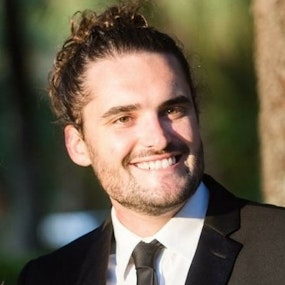
Chase Warrington
Head/Host
Globally minded professional with nearly 15 years of remote work experience leading distributed teams from locations across the US, Europe, Asia, and South America.
Head of Remote at Doist, the creators of Todoist & Twist, supporting 25M+ customers, and a leading remote-first organization with 100+ employees spread throughout 30+ countries, spanning all time zones.
I'm passionate about the movement towards distributed teams, and the positive impact it is having on income equality, the environment, work-life balance, and emerging markets. Throughout my career, I have always felt that the confines of the office were limiting in myriad ways, and to be given the freedom to choose how, where, and when you work, should be within everyone's reach. It has not always been the case, but today it is possible - and if remote at scale is done correctly, the opportunities for individuals and organizations to thrive are beyond measure.
The "why" behind my work is rooted in these beliefs and a strong desire to see the remote work movement migrate into the mainstream. With this in mind, I contribute as an instructor, writer, and speaker on subjects related to remote teamwork, for many of the major platforms empowering location-independent professionals and organizations. I've had the privilege to address teams on all continents on this subject, and present or publish work for outlets such as Forbes, Running Remote, wrkfrce, RePeople, The Remote Times, Remote-how, The Remote Future Summit, and Work From Anywhere, amongst others.



























